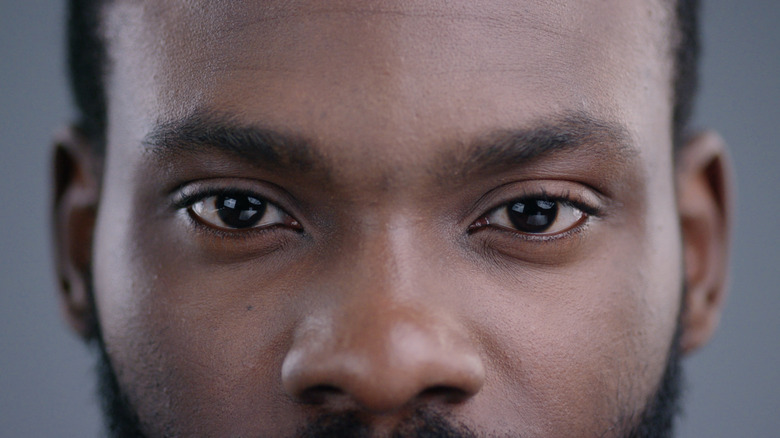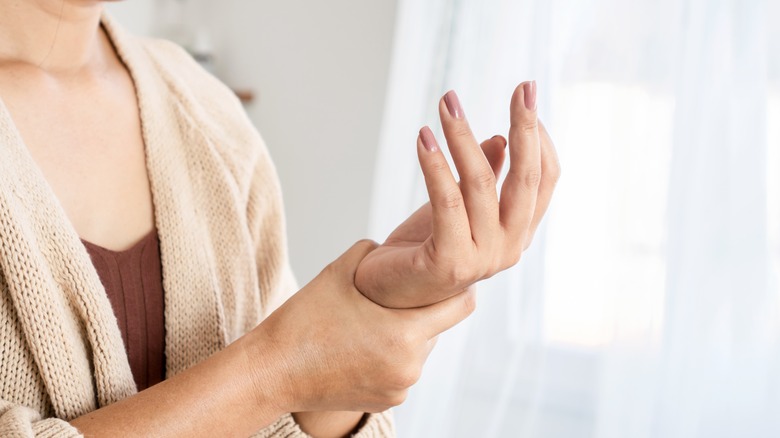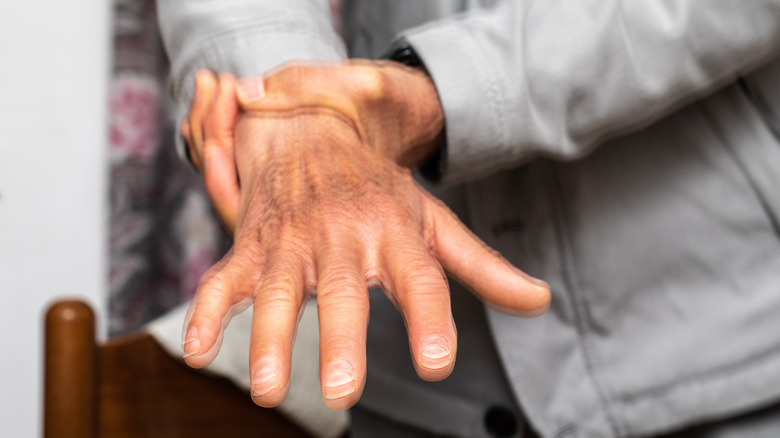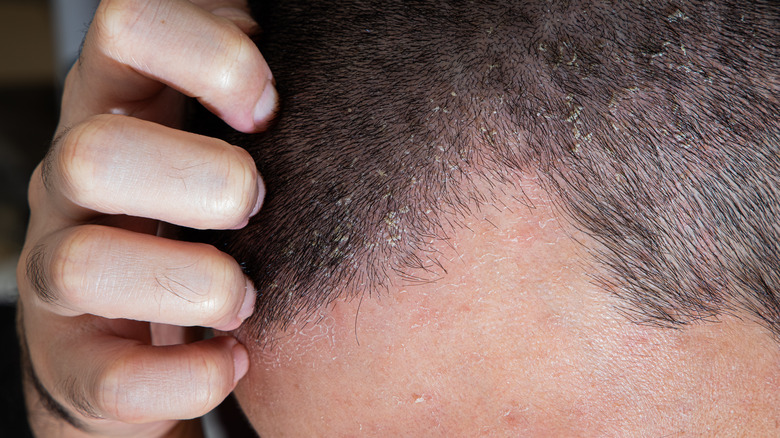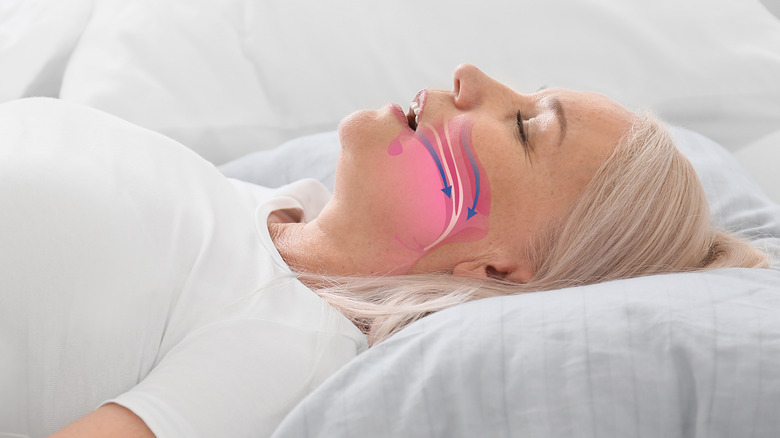Symptoms Of Parkinson's Disease You Shouldn't Ignore
When actor Michael J. Fox announced he had Parkinson's disease, it put the condition in the headlines and raised awareness. And although there are still things we don't fully understand about Parkinson's, we do know that it typically occurs in stages, according to the Parkinson's Foundation. This means that there can be red flags, which could help you detect it early and begin treating it right away.
Before we go any further, it's important to understand how Parkinson's affects the body. According to the National Institute of Aging (NIA), a person develops this disease when nerve cells located in the basal ganglia part of the brain either begin dying or become damaged. Since the basal ganglia controls movement and these cells create the chemical dopamine, fewer cells or cells that don't function properly can lead to less dopamine and movement issues. In addition, having Parkinson's can also mean less norepinephrine, an important chemical for your sympathetic nervous system. Low norepinephrine can affect things like your blood pressure and your heart (via NIA).
In the final stage of the disease, Parkinson's can become debilitating, according to the Parkinson's Foundation. Being aware of potential symptoms of this disease is crucial. Just keep in mind that the following are only some of the possible signs of Parkinson's, and that cases of Parkinson's can vary from person to person. With that in mind, if you suspect you have Parkinson's, you should speak with a medical professional.
Handwriting changes
If you have Parkinson's disease, you could experience a specific type of change to your handwriting called micrographia. As Parkinson's News Today explained, you might start by writing letters of one size but, as you continue to write, your letters become smaller and smaller. Or, you may consistently write small letters. This is because Parkinson's can damage the part of the brain that helps control motor skills like writing. In addition, other common symptoms of Parkinson's can also cause changes in handwriting. For example, if a person has slower movements or tremors because of Parkinson's, that can impact how they write. Parkinson's-related muscle contractions might also cause noticeable changes in someone's handwriting.
Like Parkinson's, there is no way to cure micrographia at this time, according to Parkinson's News Today. But that doesn't mean there aren't medications that can treat this condition. Additionally, simple changes like not writing in cursive and maintaining good posture can make a difference when it comes to this possible symptom of Parkinson's.
Blinking less often
How many times would you guess we blink every minute? Ten times? Twelve? Actually, according to the Smithsonian Magazine, on average we blink as much as 20 times a minute. And it's a good thing too because blinking is our body's natural way to help keep our eyes lubricated and free of particles like dust. But as Meadows Family Eye Care points out, someone with Parkinson's disease might find they're blinking less often. And, unfortunately, this can impact your vision.
Remember, blinking helps keep your eyes lubricated because your eyelids opening and closing helps to keep your cornea evening coated with tear film. So, if you're not blinking as often, that tear film can begin drying out over different areas of your eyes. This, in turn, can lead to bouts of blurry vision. In addition, blinking helps to replenish the tear film, so there's always a fresh amount over your cornea. But, again, not blinking as much, can throw this off and affect your eyesight.
Besides not blinking as often, some people with Parkinson's may experience other eyelid-related issues. As Meadows Family Eye Care explains, it's possible for someone with Parkinson's to have either both sets of eyelids or just the ones on one of their eyes shut involuntarily. Additionally, they could experience the opposite problem in which they can't get their eyelids to open. But both of these potential Parkinson's symptoms aren't as common as blinking less often.
Vision changes
Not everyone who has Parkinson's disease will develop vision issues, according to the American Parkinson's Disease Association. However, Parkinson's can affect basic eye movements, which in turn can cause changes in eyesight. For example, you need to use saccadic eye movements while reading.
To understand how this works, think about what you're doing as you read this article. You need to read to the end of a line and then quickly move your eyes to the beginning of the next line. Parkinson's disease can slow that movement down, making it harder to read. On the other hand, Levodopa, a medication used to treat Parkinson's, can speed up this natural movement and cause it to become erratic, which can also interfere with activities like reading.
Besides saccadic eye movements, Parkinson's can affect vergence eye movements, according to American Parkinson's Disease Association. These eye movements help you keep something in focus when it's either moving away from you or coming towards you. But if these movements are thrown off by Parkinson's, then you might experience double vision in particular when someone or something is moving nearer to you.
Loss of smell
Of course, there are many reasons why someone might lose their sense of smell. As the Michael J. Fox Foundation points out, health concerns like allergies, infections, and sinus issues can all greatly diminish someone's ability to detect scents. Still, losing this sense is also a symptom of Parkinson's disease — and it can occur decades before other symptoms develop and manifest.
Like other aspects of Parkinson's, experts are not entirely sure why some patients with this disease experience hyposmia (loss of smell), according to the Michael J. Fox Foundation. Some research shows that Parkinson's may start by affecting the area of the brain that regulates the ability to smell before traveling to other areas of the brain. Unfortunately, even though this possible symptom of Parkinson's can be an early red flag of the disease, it might go unnoticed. This means the disease could continue to worsen and do damage instead of being addressed and treated sooner.
So, what can be done if someone develops this Parkinson's symptom? Well, as the Michael J. Fox Foundation notes, there are no treatments available at this time to help with this Parkinson's-related symptom. However, the foundation is conducting a study called the Parkinson's Progressive Markers Initiative (PPMI) that monitors both people with and without Parkinson's to better understand the progression of the disease. And, yes, loss of smell is one of the symptoms being explored in this study.
Stiff muscles
Even though this symptom is one of the most common ones of Parkinson's disease, according to WebMD, it's sometimes mistaken for a completely different health issue. Stiffness in one's muscles can be a sign of both Parkinson's disease and arthritis, so someone could be misdiagnosed as having arthritis when they really have Parkinson's. However, there are two types of muscle rigidity that could be red flags of Parkinson's, in particular.
The first, according to WebMD, is called lead pipe rigidity, in which the muscles not only feel as if they cannot move but also feel heavier than usual. The second type of muscle stiffness associated with Parkinson's is cogwheel rigidity. A person with this type of muscle issue experiences jerking motions when they try to move — a bit like muscle spasms. They may also feel as if the muscles in their arms are clicking. Both types of muscle rigidity can interfere with everyday activities, like walking and balancing. And tasks like cooking could become dangerous, especially if you have cogwheel rigidity.
Fortunately, there are medications and physical therapy options available for people with Parkinson's disease who experience muscle stiffness, according to WebMD. In addition, stretching exercises like yoga can help improve muscle flexibility, and warm Epsom salt baths might help ease muscle rigidity.
Moving more slowly
Many have seen (or have had to take) typing tests in which speed and accuracy are important parts of passing. But did you know that a version of this test is used to help determine if someone has a possible symptom of Parkinson's disease?
As Healthline explained, someone taking the bradykinesia akinesia incoordination test (or the B.R.A.I.N. test), is scored on not just which keys they hit but also how long it takes them both to strike a key and then move onto the next key. The test checks for the slower movements that can occur because of Parkinson's. In fact, the medical term for this symptom is the B in the test's name: bradykinesia. What's more, this test can help determine which of the five stages of Parkinson's a person is experiencing.
Besides the B.R.A.I.N test, there are possible red flags of bradykinesia, according to Healthline. These include shuffling or dragging one's feet. Also, a person with bradykinesia may notice their muscles freezing up, so they can't move them. Additionally, certain activities like clapping and brushing one's teeth can become more challenging. Bradykinesia can also affect one's facial expression and voice.
It's important to note that bradykinesia can be a side effect of different medicines. If you're experiencing symptoms, you should ask your health care professional if anything you're taking could be impacting your muscles' movements.
Trouble with facial expressions
Imagine this: You're having lunch with a friend when you notice they're not smiling. You ask them if they're feeling alright, and they reply "yes," but they look upset. Concerned, you press them, but they continue to insist that nothing's wrong. Now, obviously the person in this scenario could be unhappy and not want to say why, but this same situation could happen because of a Parkinson's disease symptom called facial masking.
According to the Parkinson's Foundation, facial masking occurs because muscles in the face can become slower or rigid as a result of the disease. If this occurs, it's harder for someone to do things like raising their eyebrows or smile. As a result, their facial expression might not match their emotions, which can throw off how they non-verbally communicate with others. Someone with facial masking, or hypomimia, may find others are constantly asking them if they're okay (like in the above scenario) since their facial movements can sometimes make them look depressed.
While there isn't a cure for Parkinson's yet, there are medicines that can help treat this particular symptom, according to the Parkinson's Foundation. In addition, there are also special exercises used by speech-language pathologists that may help improve the symptoms of facial masking. Also, if you feel comfortable, let others know about your hypomimia. This way, they won't unnecessarily worry that you're upset, and you won't have to constantly assure them you're not unhappy.
Vocal changes
According to the Parkinson's Foundation, Parkinson's disease can make it harder for your facial muscles to function normally, but it can also have an effect on the muscles in your mouth and throat. When muscles in these three areas of your body aren't working properly, that could affect how you speak. It's not uncommon for a person with Parkinson's to have physical difficulty to the point they're straining themselves trying to make sounds. So, they may speak more softly and have difficulty communicating — especially in a noisy environment. Also, someone with Parkinson's might find they're speaking more quickly or having difficulty thinking of the right words to say.
Fortunately, there are ways a person with Parkinson's can manage vocal issues. The Parkinson's Foundation explained that collagen injections and communication devices like personal amplification devices can help with speech problems. Additionally, reading aloud, not straining your voice by shouting, and staying hydrated can all help improve speech-related issues. And don't forget, the people in your life can be a great support system. The foundation recommends coming up with a code word that a loved one can say to subtly alert you that you're not verbally communicating clearly.
Difficulty swallowing
Since Parkinson's disease can impact the muscles in your throat, mouth, and face, it's not surprising that it could cause not only speaking issues but also problems swallowing, according to the Parkinson's Foundation. In fact, this condition is known as dysphagia and is a typical symptom of Parkinson's (via Michael J. Fox Foundation).
Like other signs of Parkinson's, dysphagia can vary from person to person. For example, one person with Parkinson's disease may find they can swallow some foods normally but run into problems with other ones. A different patient, however, might always need to cough while they're eating. And while both of these scenarios can be problematic, swallowing issues can become severe enough that someone with Parkinson's could experience a potentially life-threatening condition called aspiration pneumonia. According to Mount Sinai, if this happens, foods and drink could go into the lungs and cause problems like fever, pain in the chest, wheezing, and blood when the person coughs.
Fortunately, there are lifestyle changes that can help with swallowing issues caused by Parkinson's, according to the Michael J. Fox Foundation. These include changing the consistency of foods, so they're softer and less likely to cause problems. There are also ways to make drinks thicker and easier to swallow. Additionally, simple tricks like consciously holding your breath when you swallow and swallowing with more force can make a difference.
Tremors
Even if you're not that familiar with Parkinson's disease, chances are you know of this particular symptom. It's very common for someone with Parkinson's to experience shaking not only in their feet and hands, but also in their tongue and jaw, according to WebMD. In addition, they may feel tremors inside their abdomen or chest. And while tremors can happen because of other conditions like multiple sclerosis, Parkinson's-related tremors have some unique qualities.
For starters, a person with Parkinson's is more likely to experience tremors when they're not using their muscles (via WebMD). In cases like this, they may feel tremors while they're sitting on the couch but not when they're moving around. Yet, that same person is less likely to experience tremors as they sleep. Besides "resting" tremors, someone with Parkinson's might notice that while the tremors can affect both the right and the left sides of their body, they tend to begin on either one side or the other. They also tend to be constant rather than erratic spasms.
Although it can be difficult to treat tremors with medication, WebMD explained that tremors can level off and even disappear. However, some with Parkinson's may benefit from deep-brain stimulation, an electrical current that is used on specific areas of the brain. But beyond medical intervention, cutting out caffeine and using stress management methods like meditation might help reduce the frequency or severity of tremors.
Sweating more or less often
Did you know you have anywhere between 2 to 4 million sweat glands? Sweating helps your body stay cool as it evaporates off your skin. If you have Parkinson's disease, you can develop two vastly different issues sweating issues: sweating too much or not enough.
Although we need our sweat glands to perspire, it's our autonomic nervous system that, among its other functions, determines how much you sweat and your temperature in general, according to Verywell Health. However, Parkinson's can throw off your autonomic nervous system. And if you guessed that this could disrupt your ability to sweat the correct amount and at the right times, as well as maintain a normal body temperature, you'd be absolutely right. In fact, a person with Parkinson's might find they feel hotter or colder than others in a given situation—a problem that might be exacerbated by sweating too much or too little.
If you have Parkinson's and find you're sweating more than normal or not enough, there are some lifestyle changes that can help. Parkinson's UK points out that changes like eating less spicy foods and wearing loose-fitting clothes might help reduce how much you sweat. And if you're sweating too little, opt for clothing made from lighter materials (via Parkinson's UK).
Skin changes
Itchy, oily skin and dry skin can both be simple dermatological issues, but as the Parkinson's Foundation explains, both of these very different skin conditions can also be symptoms of Parkinson's disease.
It is important to understand that oil is actually good for your skin –in the right amounts. As the Parkinson's Foundation notes, the natural oily substances secreted by specific glands in our bodies are important for our skin's good health. But someone with Parkinson's might find these glands are working overtime, leading to seborrheic dermatitis. If this occurs, then a person might have skin inflammation, redness, scaliness, and excess oil on not just their nose, eyebrows, and forehead but also their scalp. On the other hand, a person with Parkinson's might also develop the opposite problem in which their skin is overly dry.
If you have Parkinson's disease and skin problems, a dermatologist may be able to help. They may recommend a quality moisturizer for dry skin or special shampoos for scalp issues that result from excess oil, like dandruff. You also might find using unscented soaps made from glycerin helpful for Parkinson's-related oily skin issues.
Dizziness
Lightheadedness can be a sign of low blood pressure, which can happen when Parkinson's affects your autonomic nervous system (via Michael J. Fox Foundation). Keep in mind that the sympathetic nervous system is part of the autonomic nervous system. And, as the National Institute of Aging explained, Parkinson's affects the sympathetic nervous system, which in turn can affect your blood pressure.
Parkinson's disease can cause your blood pressure to become too low when you, for example, go from sitting to standing. In addition, some medications used to treat Parkinson's can affect your blood pressure. Since the disease causes the chemical dopamine to drop to lower levels in your brain, some doctors prescribe dopamine agonists to help counteract this, according to the Michael J. Fox Foundation. They may also recommend a medicine called Levodopa since the body can turn it into dopamine. And while both of these drugs have been helpful tools when treating Parkinson's disease, they can, unfortunately, cause drops in blood pressure.
Depending on what's causing a person with Parkinson's to experience low blood pressure, they might want to modify their diet by cutting out alcohol and hot drinks, advised the Michael J. Fox Foundation. They may also want to consider increasing both their water and salt intake — but this should be carried out with caution. Too much sodium can be dangerous for one's health.
Sleeping issues
If you have Parkinson's disease and struggle to get a good night's sleep, you're not alone. According to the Parkinson's Foundation, more than 75% of people with this disease have "sleep-related symptoms." Not only can certain medications throw off one's sleeping pattern, but just how Parkinson's affects the brain could make getting a restful night's sleep more challenging.
As many as 40% of Parkinson's patients experience sleep apnea, a disorder in which one's breathing is not a steady pattern. Instead, the individual is more likely to stop breathing and then start again, which can cause a less restful night's sleep and tiredness during the course of the day. Some with Parkinson's have obstructive sleep apnea, in which their muscles relax to the point that the soft tissues in their throat block or partially block their airway, making it harder to breathe.
Besides sleep apnea and obstructive sleep apnea, a person with Parkinson's could experience REM Sleep Behavior Disorder, according to the Parkinson's Foundation. Normally when we dream, only our eyes move, but someone with this disorder is able to use their other muscles. This means that if they're dreaming they're being chased, they might shout out in their sleep, jump out of bed, or even attack anyone else nearby. Given the possible dangers of this Parkinson's-related issue, it is sometimes advised for partners to sleep in separate rooms or use bed rails. You may also want to ask you health care professional about trying melatonin.



